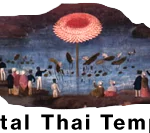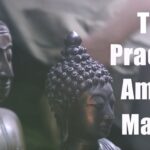There are several good lists of Buddhist movies already available on the net, such as this http://suite101.com/article/best-buddhist-movies-a95083 I’ve used these lists myself quite a bit, but hopefully this list will be different enough to be useful to somebody else. What is a ‘Buddhist’ movie? I have quite a liberal definition and that is: any film that can be said depict a ‘Buddhist worldview’ with such themes as re-birth or one that features monks and the Buddha’s teachings directly or any film that is heavily influenced by Buddhist ideas or aesthetics. Fair enough?
1) Jacob’s Ladder (1990)
Based on the Tibetan Book of the dead. According to one source (wikipedia) the screenwriter, Bruce Joel Rubin, spent two years in a Tibetan monastery in Nepal before writing the film (another source says three months). Rubin, who also wrote the script for Ghost, is an interesting man who is quoted as saying, “I don’t think life begins at birth, or even conception, I see us as spiritual beings that come into earthly experience for a reason, and leave it. My movies are kind of polemics on that.” The film’s main character Jacob Singer (Tim Robins) is a Vietnam veteran who starts to see demons. He can be thought to be in a state of ‘bardo’, a sort of dream-like state between life and death when the self’s attachments and desires populate one’s own personal purgatory. The film includes the haunting quote, which is apparently a citation from the Christian mystic Meister Eckhart “The only thing that burns in hell is the part of you that won’t let go of your life: your memories, your attachments. They burn ’em all away. But they’re not punishing you,’ he said. ‘They’re freeing your soul. If your frightened of dying, and your holding on, you’ll see devils tearing your life away. If you’ve made your peace then the devils are really angels freeing you from the earth.” The speech, delivered in the film by Robins’ sage chiropractor, can be heard in full on Thom Yorke’s collaboration with UNCLE, ‘Rabbit in Your Headlights’. The film entertains with its horror and frenetic pace and, while it clearly hints at spiritual ideas and has a highly unconventional plot, never comes close to pretention. A perfect feature film: entertaining, fun and poetic.
2) The Fountain (2006)
Some people hate this for the obscurity of its plot, which takes places over three different dimensions (or past lives). Or something. One is about a scientist trying to discover the cure for his wife’s disease, the other about some sort of spirit that lives in on a deeply-symbolic island that floats in space and the other about a conquistador battling his way into a Mayan temple. I can’t help but suspect that that the vitriol spat out against this film comes from the fact that it doesn’t have a clear narrative and that makes people feel stupid. If you read it as a philosophical diatribe on the importance of accepting death then, yes, I think you are bound to find its conclusions facile. But, while I generally enjoy looking for hidden meanings and morals in a film, I find that this film favors a more intuitive and (dare I say it?) open-to-the-mystery sort of viewing. The film has a highly-artificed style, almost like a storybook for adults, a spiritualy-pleasing dim phosphorescence pervading throughout. I feel that Aronofsky intended this to be his masterpiece and clearly put a great deal of creative energy and thought into it. It is filled with symbolism (an imperfect introduction to which can be found here: http://www.lariat.org/AtTheMovies/new/fountain.html) There’s some discussion on the internet as to what makes this a Buddhist flick and it certainly also contains Christian themes. The Buddhist themes that I see are that it it seems to say that life can be seen to be occurring on many levels on the level of different ‘lives’, different realms (the ‘real’ realm, the realm of imagination, the symbolic realm). The causes of our suffering will keep recurring until it eventually comes to be vanquished by a certain self-understanding. Until we perceive that it is attachment to life that causes death (our dread of which is caused by our failure to see that life is always ongoing beyond the death of an individual’s body), we will not be released from death. Anyway, as I say, I think it’s a film that is best enjoyed by momentarily suspending the interpretative faculties.
3) Uncle Boonmee Remembers His Past Lives (2010).
This is a bizarre dream of a film, full of slow scenes and surreal humour. The director, Apichatpong Weerasethakul, creates a particular sense with visuals and tone – rather than with his narrative, which is often particularly non-linear – and it is this sense, this atmosphere which is a uniquely rewarding use of the medium of film. As Boonmee’s soul prepares for its flight from his body, he makes a journey to a cave studded with sparkling lights. Director Apichatpong Weerasakul’s style is one that seems to be operating on many symbolic layers, always suggesting something darkly beautiful that defies re-telling or literal interpretation, that can only be felt with full force on film. The cave scene is perhaps the finest representation of this style yet. Boonmee remembers that he had once lived in that cave. We understand that, like the film itself, the cave is a microcosm of the inter-connected universe and, as Boonmee journeys through it, he journey through past and future, through time and the different dimensions of sentience, simultaneously a dying man walking as a tourist through a cave and as a sentient form like any other traversing the mundane and the eternal. That said, the film (perhaps inevitably) sometimes irritates under the weight of its own unconventionality. A scene in which Boonmee recalls what his future life will be, as a monster that joins an army and then suddenly disappears, frustrates as it hints at some profound meaning but doesn’t actually seem to have one. Overall, the film represents a rare and brave attempt at depicting a different worldview, one in which the animal realm connects with the human realm and the ghostly realm, where tales from past lives inform us of the true meaning of the present.
4) Samsara
‘How do you lose a drop of water?’ a rock asks. A monk, after years of meditation in an isolated cave, returns to find that he is still encumbered by sexual desire. He goes and gets married and finds life in a small village oppressive and dull. So he returns to the monastery and looks at the other side of the rock and finds the answer to his question. A film as nicely done as this neat little narrative gimmick.
5) Onibaba (1964)
In Kaneto’s Shindo’s Buddhist parable, samurai fleeing a far-off war stumble about in suggestively swaying grass, only to be murdered by two women living alone. They are then dumped into a suspiciously vulvic hole. The frenzy and hysterical jealousy engendered by sexual desire is creatively evoked in this film. A scene that always springs to mind is of a man lying entranced, stroking the dirt at the entrance to the dark and suggestive hole like a rabid dog in a moment of delirious rest. I can’t really do any better than this review: http://www.criterion.com/current/posts/317-onibaba-black-sun-rising
6) Dojoji Temple (1976)
The highly-ornate style of the Noh theatre – which, to the practiced observer, is said to be able to draw one into a deep and profound sense of peace and a sense of the inter-connectedness of things – is replicated in this motion-stop puppet animation. A lovely, skillfully-crafted piece. Unfortunately, few of Kawamoto’s other works live up to this standard. Okay so, at under twenty minutes, it isn’t a feature. But you can watch it in full for free here.
7) Traveller’s and Magicians (2003)
A charming film by the multi-talented, eccentric monk Dzongsar Jamyang Khyentse Rinpoche. It is the first feature film to be shot in the reclusive Buddhist kingdom of Bhutan. A trendy young government official decides to up and leave the sleepy backwater he has been stationed at to respond to an American woman’s invitation for him to live and work in America. On the way, he meets a monk, an attractive woman and various other characters. The monk tells him the story of a restless young man who is transported by magic to where a woodsman lives in isolation with his tempting wife, a parable about the dangers of desire and restlessness. The open-ended ending which relates to the nature of story-telling itself is one that often doesn’t work. But here it works beautifully. It’s quite low budget and slow-paced, which is all part of its charm.
8) Kundun (1997)
A high-budget feature from Martin Scorcese about the Dalai Lama. It’s superbly made and sumptously-designed but, towards the end, the film seems to be lacking something. Possibly Scorcese floundered with the intrinsic unsexiness of making a film about the life of a monk.
9) The Burmese Harp (1956)
A film by Kon Ichikawa based on Michio Takeyama’s novel Harp of Burma. The film follows the exploits of a renegade Japanese soldier towards the end of the war. Having almost died in an unsuccessful attempt to stop a fanatical Japanese captain from needlessly killing himself and his men, he is rescued by a monk whose robe he promptly steals. Later, Burma, which is here the land of the Buddha and of timelessness and pagodas, as well as the carnage he sees around him, makes him into a real ascetic who opts not to return with his regiment to Japan. The understated ending is particularly effective.
10) Jan Dara (2001)
What’s nice about this film is that it doesn’t lure us into the moral cliches that often crop up when a film conforms to an arc. It’s just sort of a bunch of stuff that happened. Ayoung boy is adopted by his rich uncle. His uncle is a jerk. In an American film, his mis-treated nephew would, Cinderella-like, magically transform into a noble-hearted gentlemen. But, as would probably happen in real life, he doesn’t. His uncle’s a jerk and treats his nephew badly and his nephew becomes a jerk who treats people badly. What goes around comes around. I guess that’s sort of Buddhist, right? It’s worth checking out another one of Nonzee Nimbutr’s films, Nang Nak (1999), which is a dramatization of a popular Thai myth about a soldier who returns to live with his wife, unaware that she has turned into a murderous ghost and is later exorcised by a magic monk.
Other Films
Siddhartha (1972)
A faithful not-to-bad film version of Herman Hesse’s thought-provoking book. A young man alive during the time of the Buddha follows his own spiritual path, first as a saddhu then as a successful but principled merchant, then as a corrupted lover of courtesans and gambling, then as a wise old ferryman. There’s not too much more to say about it other than it’s not bad and you’re likely to enjoy it more if you’ve read the book first.
Tropical Malady (2004)
Tropical Malady is, again, questionably Buddhist, which is why it’s not in the top-ten. But it’s one of my favorite films of all time, so I’m going to try to make you believe it’s about Buddhism. A slow-moving story about a soldier who tries to seduce a young man who works at an ice-cutting factory. We sense that the ice-cutter has undergone some dark past, but this is only ever hinted at. Just as thing start coming to a head, the movie abruptly changes into a legendary story about a soldier searching searching for a malevolent shaman who has disguised himself as a tiger in the jungle. A monkey tells the soldier, ‘you think that you chase the tiger, but really the tiger chases you.’ As he moves through this confusing and occasionally breathtaking jungle of earthly delights, we are genuinely uncertain of the conclusion – will it lead to his doom or will he be a feted conqueror of the evil wizard? The end seems to reveal a common enough Buddhist sentiment. Desire becomes you, absorbs you, causes you to die. In addition, the ambiguity of the jungle creates that beautiful feeling of foreboding, that mystery and charm and also that minor element of horror, that is a rarely so passionately eulogized part of falling in love.
Enlightenment Guaranteed (2000)
A low-budget German feature about two brothers who travel together to stay at a Zen temple in Japan. Much of the comedy of the film revolves around the bizarreness of Japan and a lot of time is devoted to how the brothers cope with not being able to find their hotel. One brother is quite lax in his general attitude towards life, the other quite precious. It is the former who seems to thrive more at the temple. Quite obviously low-budget with an imperfectly drawn plot, the subtle dialogue, convincing characters and superb acting is what makes this film a decent watch.







